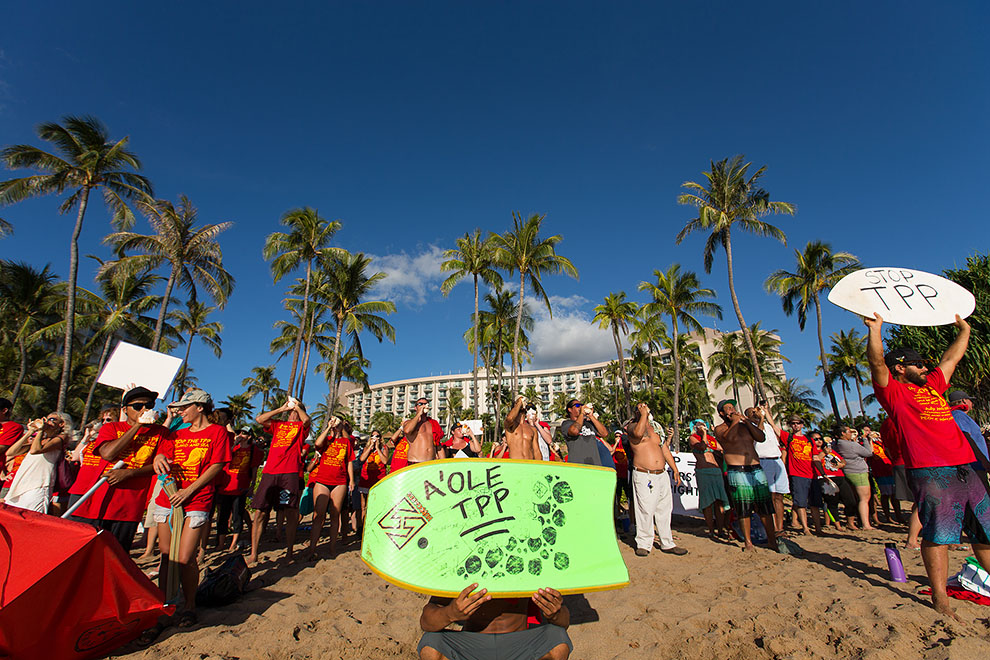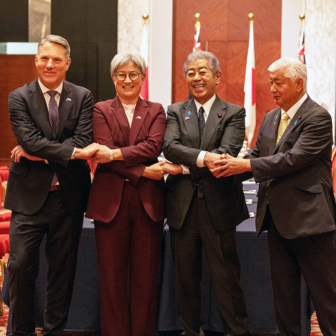Winston Churchill’s famous description of Russia as a “riddle, wrapped in a mystery, inside an enigma” could equally well be applied to the Australian Senate. It’s unlikely that one in a hundred Australian voters could explain how the Australian Motoring Enthusiast Party, represented (quite ably, so far) by Ricky Muir, came to hold a seat in our upper house, or describe the arcane rules associated with a double dissolution. The one thing anyone with any interest in politics knows is that the Senate, because of its power to block legislation, has been the bane of prime ministers of both political parties for generations.
Most people outside Australia are, of course, unaware of the very existence of this mysterious body. Last week, however, the Australian Senate appeared on the world stage, extending its blocking power to frustrate the initiatives of the most powerful man in the world, Barack Obama.
The occasion was what, it was hoped, would be the final round of secret negotiations leading to the finalisation of the Trans-Pacific Partnership Agreement, or TPP, described by its backers as “the biggest free trade deal in history.” As the negotiations neared their end, disputes familiar from past trade agreements, over such issues as access to the Canadian market for dairy products, emerged as potential sticking points. But disputes like these have been resolved in the past.
The biggest single sticking point, at least according to the New York Times, was not about free trade but about restrictions on trade. US negotiators demanded an extension of existing restrictions on trade in pharmaceuticals that would greatly increase the cost of Australia’s Pharmaceutical Benefits Scheme. Such a move had previously been pushed, and rejected by the Senate, in legislation to implement the Australia–US Free Trade Agreement in 2004.
According to the New York Times, Australia’s trade minister Andrew Robb advised the American side that an agreement along the lines proposed would never be accepted by the Australian parliament – by which, of course, he meant the Senate. When the talks broke down over this and other issues, Robb made a virtue of necessity, saying that Australia had “walked away.”
But what, exactly, is the United States proposing in relation to pharmaceuticals? Since the text of the draft agreement remains secret even now, we must rely on leaks (notably from WikiLeaks) and insider speculation. From these sources, it appears that the key demand was for “data protection” for a period of twelve years for new pharmaceuticals, particularly those described as “biologics.”
It’s natural to think of this proposal in the context of long-running attempts to expand the scope and duration of patent and copyright protection, under the banner of “intellectual property.” In the judgement of the great majority of economists, the extension of intellectual property has gone too far already.
But data protection represents something far worse, undermining the very basis of the arguments that justified patents and copyrights in the first place. The central idea of patents was to promote the diffusion of knowledge by replacing the practice of hiding new inventions as “trade secrets.” In return for publishing a full description of their idea, inventors were awarded the exclusive right to control use of their invention for a limited period. To quote the World Intellectual Property Organization, “the obligatory publication of patents and patent applications facilitates the mutually-beneficial spread of new knowledge and accelerates innovation activities by, for example, avoiding the necessity to ‘re-invent the wheel.’”
The key idea behind data protection, by contrast, is that data on the safety and effectiveness of new drugs should remain the property of the firm introducing those drugs long after they enter the market. This protection is additional to the monopoly rights associated with patents and undermines the central rationale of the patent system. In effect, the pharmaceutical companies want to have their cake and eat it; they want to enjoy the monopoly rights associated with the patent system while keeping all the benefits of trade secrecy. The public pays more, but the desired diffusion of knowledge doesn’t take place.
Somewhat lost in the last-minute debates about data protection has been the even more serious assault on the public interest represented by the proposed investor–state dispute settlement, or ISDS, clauses in the TPP. ISDS clauses are increasingly common features of international trade agreements, including a number to which Australia is a party. Supposedly, the idea is to ensure that international investors are not treated unfairly relative to their domestic counterparts under national or state legislation. Disputes arising from these laws would be assessed by an impartial panel of arbitrators.
In reality, ISDS clauses give multinational corporations the right to challenge any kind of national policy they dislike. The arbitrators are invariably selected to be pro-business, and have the power to override national courts.
The Australian government learned a salutary lesson about the ISDS process when the High Court rejected challenges by US tobacco companies, including Philip Morris, to our plain packaging laws for cigarettes. Instead of accepting the decision of our highest court, Philip Morris found a more promising legal approach by incorporating itself in Hong Kong, which has a trade agreement with Australia incorporating ISDS provisions. Using this utterly bogus claim to standing, Philip Morris has brought an ISDS action against Australia. (The company has also ginned up spurious actions under the World Trade Organization by such major sources of Australian tobacco as Ukraine.)
As a result of this misuse of the system, the Australian government has turned against ISDS. The same is true of the European Union, which is negotiating a deal with the United States similar in scope to the TPP. Unfortunately, Trade Minister Robb has signalled a willingness to accept a modified version of ISDS.
The failure of last week’s talks doesn’t mean that eventual agreement on a TPP incorporating substantial giveaways to corporations is impossible. But it has derailed the Obama administration’s hopes to have the deal wrapped up this year. It is now impossible for the US Congress to ratify the deal before 2016, a presidential election year. This in turn means that it will be more difficult for Hillary Clinton, the likely Democratic candidate, to avoid taking a stand, as she has managed to do so far. If she rejects the deal, the likelihood of its passage is greatly reduced.
Should the TPP fail, it is unlikely that the role of the Australian Senate in stopping it will be remembered. But in protecting Australian patients, and the Pharmaceutical Benefits Scheme, against the attacks of Big Pharma, the Senate is living up to the “house of review” role envisaged by the authors of the Australian constitution. •




